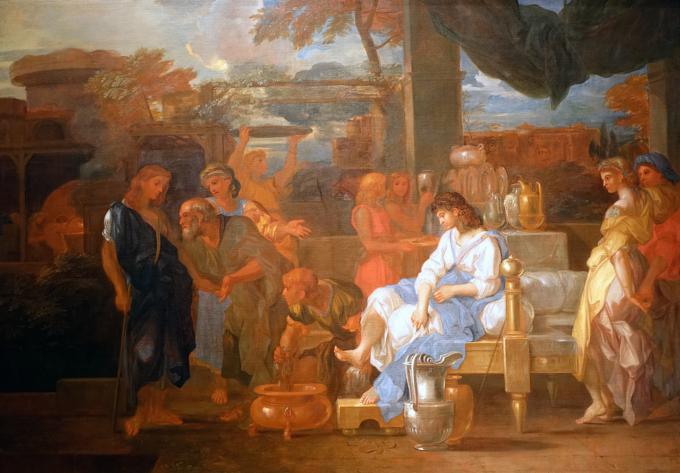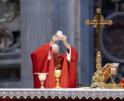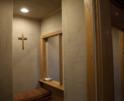
Faith
It is the combination of both listening and doing that constitutes hospitality. Listening to people helps us do the appropriate thing to make them welcome.

O'Grady
One of the three top characteristics of a successful parish is hospitality. The other two are: homilies -- brief and biblical; and music -- singable and consistent. Interestingly, study after study of successful parishes of any Christian denomination, including Roman Catholic, reports those as the top three. Also of interest is that the next several topics are similar and appear in varying rankings, but they are there, including youth ministry, parish outreach, and leadership presence.
You will not be surprised that the Bible has a lot to say about hospitality, primarily because this was supposed to be a characteristic of individual Jews, Jewish families, and the whole people of Israel.
Remember Abraham and Sarah welcoming the three strangers? They turned out to be angels with very good, indeed impossibly good, news for the aged couple.
Recall Jesus' comments when he was not given the usual and customary Jewish welcome, especially water to wash his feet when he entered someone's home? Or how the Gospel writers report the welcome Jesus does receive visiting his friends Martha, Mary, and Lazarus at Bethany?
If we jump several hundred years to the Rule of St. Benedict, he reminds the monks "Guests are to be welcomed as Christ, for he himself will say, 'I was a stranger and you welcomed me.'" (Rule of St. Benedict, #53)
In some sense, the whole parish and certainly those gathered in Sunday assembly must be marked by hospitality.
Many of the ministries we'll see in the coming weeks have specific services but among all of them, there always needs to be that sense of welcome to the stranger, certainly to new people, and to one another each week.
In Luke (10: 38-42), we get a glimpse of the two sides of hospitality: listening and doing. The two sisters, friends of Jesus, seem each to be exercising one or the other of these aspects of hospitality. Mary is listening -- much to the chagrin of her sister Martha, who is very busy with all the details of hospitality or doing.
It is the combination of both listening and doing that constitutes hospitality. Listening to people helps us do the appropriate thing to make them welcome. If someone comes to your home after a longer journey, you are probably going to say something along the lines of "Come in, sit down. Can I get you something to drink?" or "How was the trip?" Once you have a sense of how the traveler is, you might then address dining, accommodations, etc.
In a parish, there are multiple levels of hospitality that extend beyond that of liturgical life. Are phone calls answered with a clear and friendly tone? How about callers at the office? If messages are left -- voicemail, email, texts -- are they answered promptly? How about responses to the parish's social media?
Meanwhile, at the church, are parishioners -- of all ages, frequent or occasional; newcomers and strangers -- all greeted and welcomed and assisted, if need be, to make themselves at home?
Have you ever gone into a church for the first time and sat in the "wrong" pew? You know, you arrive a bit early because you are new; you pick a row and wait for Mass to begin. Then, just a few minutes before the processional music starts, the "owners" of the pew arrive and first glare at you, then push reluctantly past or over you. In the meantime, you're stymied as the pews immediately in front and behind are completely empty. Hospitality is every parishioner's business and responsibility.
Keep in mind that the whole parish, and especially the weekend assembly at Mass, is not the same as the fans at the stadium or arena of your favorite professional or collegiate team. You are brought together by a call from Jesus Christ in his church. You are very different in your parish from that other group, even if you are also a member of the fan base.
Once, after Mass, I recall someone coming up to me and saying, "You said Catholics are better than everyone else." I was sure I had said something more along the lines of "We Catholics have a special responsibility as followers and disciples of Jesus Christ. We must be better than all the others." I was hoping to convey that discipleship of Jesus was a great responsibility and we are supposed to carry it on because of Jesus. My response was, "Sorry about that. What I meant was that all of us Catholics: you, me, all these people here at Mass, our bishop, other priests, and even the pope are supposed to be better."
That being better starts for all of us to be aware of that basic human virtue -- hospitality -- prized by the people of Israel; by the church, the new People of God; and by generations of families; should be a mark of all our parishes and all the liturgies celebrated in them.
Recent articles in the Faith & Family section
-
7 reasons to pray for the cardinals in conclaveJaymie Stuart Wolfe
-
Legacies in Ordinary TimeLucia A. Silecchia
-
What are my Easter duties?Jenna Marie Cooper
-
On the Camino: Jentillaks and jazzMark T. Valley
-
From the Eternal CityArchbishop Richard G. Henning























